Rotational symmetry: summary and recommendation
What reputable sources say
-
The NCETM glossary defines rotational symmetry as: a 2-D shape has rotational symmetry about a point if it matches itself after a rotation through some angle greater than 0° and less than 360°. It defines the order as the number of distinct matches in a full turn. Saying "order 1" is technically true because every shape matches after 360°, although this is not very informative.
-
GCSE revision materials commonly avoid "order 0". They either write "no rotational symmetry" or accept "order 1" for the trivial full-turn only case. Many teachers prefer to say "no rotational symmetry" to avoid confusion.
-
General references agree that order means a positive integer count of matching orientations in a full turn.
Which description is best
- "Order 0" is not correct in school mathematics because order is defined as a positive integer.
- "Order 1" is technically defensible, since the shape matches after 360°, but it often misleads pupils into thinking there is a non-trivial rotation.
- "No rotational symmetry" is the clearest classroom language when there is no match for any angle strictly between 0° and 360°.
How to describe very irregular shapes
Use plain wording: asymmetric with no rotational symmetry. This is precise and avoids implying any special order.
My recommendation for secondary teaching
- Teach the NCETM definition that requires some angle strictly between 0° and 360°.
- When a shape only matches after a full turn, write no rotational symmetry.
- If an exam board allows "order 1", you may mention it as a technical aside, yet reserve "order n" for n ≥ 2 in everyday teaching.
- For especially uneven shapes, describe them as asymmetric with no rotational symmetry.
In short
Avoid "order 0". Prefer "no rotational symmetry". Acknowledge "order 1" only as a technical note where mark schemes permit it.





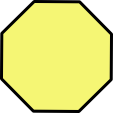
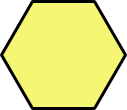



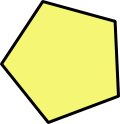

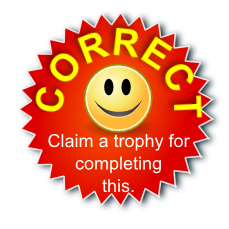
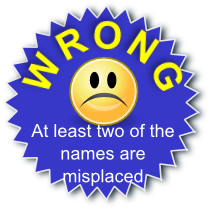




Transum,
Wednesday, September 3, 2014
"Knowing the names of the polygons is only the start. Each shape has its own properties which define it. There are families of shapes and some shapes can be identified with more than one name.
What is the definition of the word Polygon? Find out by distinguishing between examples and non-examples in this drag and drop activity.
The next step is to show your knowledge of Polygon Properties with our interactive matching activity."
Luke Farrand, Rosmini College
Friday, October 19, 2018
"It has recently come to my knowledge when attempting one of your activities under Topic - Geometry - Activities - Polygons - Rotational Symmetry there is an error in this task.
If I am not mistaken all shapes have a rotational symmetry of at least one, however in this task it shows shapes with a rotational symmetry of one are considered none.
This little mistake may be enough to make someone fail their exam or fall one excellent credit short of endorsement in this wrong teaching. Therefore I recommend you change it before an unfortunate student suffers that fate."
Transum,
Friday, October 19, 2018
"Dear Luke,
Thank you so much for taking the time to make a comment about rotational symmetry.
Firstly I must say that sometimes in Mathematics everyone does not agree on certain definitions. For many years the UK defined a billion as 1012 while the US defined it as 109. Some people believe that zero is a member of the set of natural numbers while others do not. I’m afraid rotational symmetry may also attract mixed opinions.
According to all of the online references and textbooks I have seen there is no such thing as rotational symmetry of order one. As Wikipedia states: "Note that '1-fold' symmetry is no symmetry (all objects look alike after a rotation of 360°)".
If you have a reference that disagrees with this way of thinking please let me know.
I really would appreciate hearing any further comments you may have about the activities on the Transum website.
Best wishes "
Tony, VAS
Wednesday, September 1, 2021
"Dear Transum and Luke,
I agree with luke's statement here. According to BBC Bitesize, it is clearly stated that the minimum number of rotational symmetry is 1.
I would love to hear a statement from all of you!
[Transum: Thanks very much Tony for the link showing that respected websites disagree with the definition. I have now taken time to do some more research and I think the balance of opinion agrees with you so. Having said that I don't think the word 'none' on the draggable card is wrong. Perhaps 'zero' would be wrong but I think 'none' is technically correct isn't it?]"
Paul Hall, Private Tutor
Wednesday, December 28, 2022
"Dear Sir/Madam,
Many thanks for your website I teach online, and I don't know what I would do without Transum.
My comment concerns Rotational Symmetry, of order 1, as I see it.
A rectangle has RS of order 2. It looks the same two ways around. One of these two ways includes the unrotated shape.
A scalene triangle has RS of order 1. It looks the same one way around. This is the unrotated shape.
To say that it has RS of order 0 is to say that we ignore the original orientation, which we do not do in the case of the rectangle, otherwise the rectangle has RS of order 1.
This makes a special case of the shape, and of the number 1.
In one case, 1 = 1, and in the other case, 1 = 0.
This is, of course, nonsense.
I look forward to your reply.
I understand your comments about zero being a natural number, or not, and the definition of a billion. However, I have never seen exam questions which would catch people out if they made the wrong choice.
These are matters of choice you can decide that 0 is a natural number, or not, as you wish. You can decide on the definition of a billion, as you wish, though I deprecate words like zillions, and wish that people would powers of 10.
Respectfully yours: P C Hall."
Transum,
Thursday, December 29, 2022
"Dear Paul, thank you so much for your comments. I agree that we should not say that a scalene triangle has rotational symmetry of order zero or one. I believe the best statement is that it has no rotational symmetry. It’s a special case just like the word group. You could have a group of ten people you could have a group of three prople but you would not describe one person as a group!"